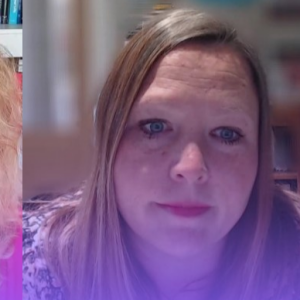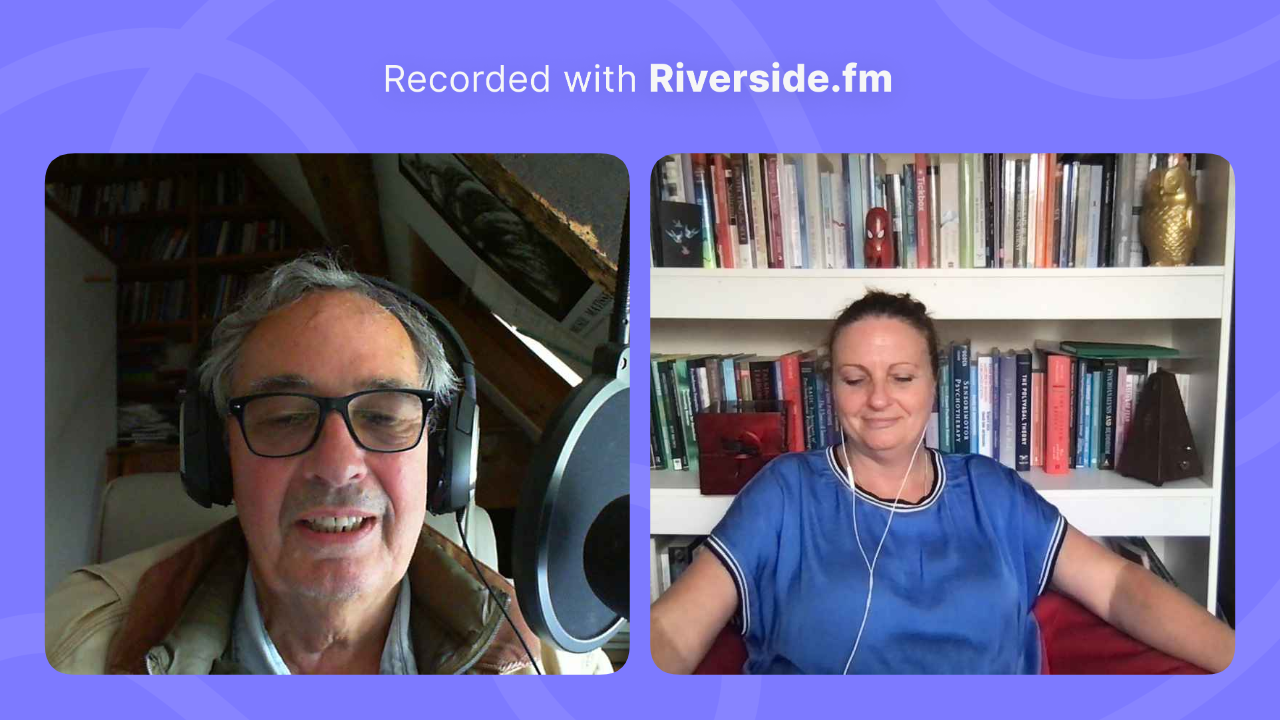The Locked up Living Podcast: Surviving and thriving in prisons and other challenging environments
Can institutional culture challenge your mental health? What if your job makes you feel shame, sadness, grief, disgust and fear? What if you are expected not to feel? Or you are expected to be relentlessly competitive? What it’s like to live or work in a prison? Does working with people who commit murder, child abuse and rape affect people who work in prisons and the wider criminal justice system? How do people survive and thrive when facing significant challenges to our emotional health over a lengthy period? How do we protect ourselves and stay compassionate, loving and trusting? Importantly, how do we find and preserve hope? Fyodor Dostoevsky wrote that “The degree of civilisation in a society can be judged by entering its prisons”. In this weekly podcast ,your hosts, David Jones (Forensic psychotherapist) and Dr Naomi Murphy (Consultant Clinical & Forensic Psychologist) hope that exploring less visible aspects of prisons will help listeners see that prisons are a window into society and let us see people not only at their worst but also at their best. We feature a rich range of guests sharing snap shots of life in prisons and take a look at hospitals, schools, sport and the police in order to learn from other institutions. We learn about challenges to human integrity and hear important lessons and heart-warming stories about survival and growth when facing adversity in harsh places. We hope that sharing our conversations can help you make changes to your own relationship with institutions that might challenge your emotional health and well-being. Follow and connect with us and give us feedback. Let us know what you think works, and also what doesn’t. We want you to look forward to the podcast each week. We’ll also be extremely grateful for any reviews that you give us. A simple star or two or a thumbs up will do. Email: lockedupliving@gmail.com or connect with us on: Substack: https://lockedupliving.substack.com Twitter: https://twitter.com/LockedUpLiving Linkedin: https://www.linkedin.com/in/naomimurphypsychologist/ https://www.linkedin.com/in/david-jones-41910b12/ Insta: https://www.instagram.com/lockedupliving/
Episodes

4 days ago
4 days ago
Keywords
criminal justice, parole, life sentences, probation, reintegration, mental health, support systems, identity, relationships, research
Takeaways
Preparation for parole does not equate to preparation for community life.
The parole board's focus is on compliance rather than personal growth.
Academic credentials can provide a pathway for reintegration.
Probation often lacks effective support for individuals on life sentences.
Institutionalization can hinder personal development post-release.
Access to housing and employment is a significant challenge for released individuals.
Relationships are crucial for successful reintegration but often lack support.
Disclosure of past convictions can complicate personal relationships.
Identity management is a complex issue for those released from prison.
Lived experience should inform criminal justice policy and practice.
Summary
In this episode of the Locked Up Living podcast, Naomi Murphy and David Jones speak with Simon Scott, who shares his extensive experience in the criminal justice system, both as a former inmate and as a professional working in the field. They discuss the challenges faced by individuals preparing for parole and the stark contrast between that preparation and the realities of life in the community. Simon reflects on his academic journey, the inadequacies of probation support, and the complexities of reintegrating into society after a long prison sentence. The conversation highlights the importance of relationships, mental health support, and the need for a more empathetic and informed approach to criminal justice policy.

4 days ago
4 days ago
Keywords
criminal justice, parole, life sentences, probation, reintegration, mental health, support systems, identity, relationships, research
Takeaways
Preparation for parole does not equate to preparation for community life.
The parole board's focus is on compliance rather than personal growth.
Academic credentials can provide a pathway for reintegration.
Probation often lacks effective support for individuals on life sentences.
Institutionalization can hinder personal development post-release.
Access to housing and employment is a significant challenge for released individuals.
Relationships are crucial for successful reintegration but often lack support.
Disclosure of past convictions can complicate personal relationships.
Identity management is a complex issue for those released from prison.
Lived experience should inform criminal justice policy and practice.
Summary
In this episode of the Locked Up Living podcast, Naomi Murphy and David Jones speak with Simon Scott, who shares his extensive experience in the criminal justice system, both as a former inmate and as a professional working in the field. They discuss the challenges faced by individuals preparing for parole and the stark contrast between that preparation and the realities of life in the community. Simon reflects on his academic journey, the inadequacies of probation support, and the complexities of reintegrating into society after a long prison sentence. The conversation highlights the importance of relationships, mental health support, and the need for a more empathetic and informed approach to criminal justice policy.

Wednesday Jun 25, 2025
Eppie Sprung (Audio); Navigating Life After Conviction: Eppie's Story
Wednesday Jun 25, 2025
Wednesday Jun 25, 2025
keywords
Next Chapter Scotland, stigma, parenting, criminal justice, children's book, identity, mental health, support, resilience, sexual offences.
summary
In this conversation, with David and |Naomi Eppie Sprung, the founder of Next Chapter Scotland, shares her journey of navigating life after a conviction for a sexual offense. She discusses the inspiration behind her children's book (Here with You) aimed at helping parents talk to their children about difficult pasts. Eppie reflects on the stigma she faces, her identity as a mother, and the importance of honesty in family conversations. She emphasizes the need for compassion and understanding in the criminal justice system and shares her strategies for coping with media attention and personal challenges.
In August Next Chapter Scotland will be launching a Scotland-wide report into the impacts faced by people who have been involved with the criminal justice system and calling for the system-wide changes.
www.herewithyoubook.co.uk
www.nextchapterscotland.org.uk
takeaways
Eppie's book aims to facilitate conversations about difficult pasts.
Stigma and discrimination are significant challenges for those with criminal records.
The importance of community support in overcoming personal challenges.
Eppie's identity as a mother is central to her healing process.
Honesty with children about the past fosters trust and understanding.
Self-compassion is crucial for mental well-being.
Eppie believes in the potential for change and redemption.
The media's portrayal of individuals with convictions can be harmful.
Eppie's charity focuses on helping others navigate their pasts.
Creating a supportive environment is essential for healing.

Wednesday Jun 25, 2025
Eppie Sprung (Video); Navigating Life After Conviction: Eppie's Story
Wednesday Jun 25, 2025
Wednesday Jun 25, 2025
keywords
Next Chapter Scotland, stigma, parenting, criminal justice, children's book, identity, mental health, support, resilience, sexual offences.
summary
In this conversation, with David and |Naomi Eppie Sprung, the founder of Next Chapter Scotland, shares her journey of navigating life after a conviction for a sexual offense. She discusses the inspiration behind her children's book (Here with You) aimed at helping parents talk to their children about difficult pasts. Eppie reflects on the stigma she faces, her identity as a mother, and the importance of honesty in family conversations. She emphasizes the need for compassion and understanding in the criminal justice system and shares her strategies for coping with media attention and personal challenges.
In August Next Chapter Scotland will be launching a Scotland-wide report into the impacts faced by people who have been involved with the criminal justice system and calling for the system-wide changes.
www.herewithyoubook.co.uk
www.nextchapterscotland.org.uk
takeaways
Eppie's book aims to facilitate conversations about difficult pasts.
Stigma and discrimination are significant challenges for those with criminal records.
The importance of community support in overcoming personal challenges.
Eppie's identity as a mother is central to her healing process.
Honesty with children about the past fosters trust and understanding.
Self-compassion is crucial for mental well-being.
Eppie believes in the potential for change and redemption.
The media's portrayal of individuals with convictions can be harmful.
Eppie's charity focuses on helping others navigate their pasts.
Creating a supportive environment is essential for healing.

Sunday Jun 22, 2025
Sunday Jun 22, 2025
keywords
assisted dying, suicide, palliative care, mental health, grief, legislation, death, cultural attitudes, pandemic, healthcare
summary
In this conversation, Dr. Rachel Gibbons, David Jones and Dr Naomi Murphy discuss the complexities surrounding assisted dying, its implications, and the cultural shifts in attitudes towards death. The dialogue explores the differences between assisted dying and suicide, the role of palliative care, and the emotional landscape of dying, particularly in light of the pandemic. Dr Gibbons emphasizes the need for thoughtful discourse and safeguards in the legislation surrounding assisted dying, while also reflecting on personal experiences with grief and the societal attitudes towards death.
takeaways
Assisted dying is a global movement gaining traction.
Terminology around assisted dying varies by country.
Cultural attitudes towards death are shifting post-pandemic.
There is a significant difference between assisted dying and suicide.
Quality of end-of-life care is crucial.
Palliative care needs to be improved for better outcomes.
The emotional landscape of dying is complex and charged.
Societal biases can impact decisions around assisted dying.
Grief can manifest differently based on relationships.
Legislation around assisted dying requires careful consideration and safeguards.
Website with links to papers, book.
https://www.drrachelgibbons.co.uk/
titles

Sunday Jun 22, 2025
Sunday Jun 22, 2025
keywords
assisted dying, suicide, palliative care, mental health, grief, legislation, death, cultural attitudes, pandemic, healthcare
summary
In this conversation, Dr. Rachel Gibbons, David Jones and Dr Naomi Murphy discuss the complexities surrounding assisted dying, its implications, and the cultural shifts in attitudes towards death. The dialogue explores the differences between assisted dying and suicide, the role of palliative care, and the emotional landscape of dying, particularly in light of the pandemic. Dr Gibbons emphasizes the need for thoughtful discourse and safeguards in the legislation surrounding assisted dying, while also reflecting on personal experiences with grief and the societal attitudes towards death.
takeaways
Assisted dying is a global movement gaining traction.
Terminology around assisted dying varies by country.
Cultural attitudes towards death are shifting post-pandemic.
There is a significant difference between assisted dying and suicide.
Quality of end-of-life care is crucial.
Palliative care needs to be improved for better outcomes.
The emotional landscape of dying is complex and charged.
Societal biases can impact decisions around assisted dying.
Grief can manifest differently based on relationships.
Legislation around assisted dying requires careful consideration and safeguards.
Website with links to papers, book.
https://www.drrachelgibbons.co.uk/
titles

Wednesday Jun 18, 2025
Emma Webb (Audio); The Untold Stories of Abuse in gymnastics and other athletic events
Wednesday Jun 18, 2025
Wednesday Jun 18, 2025
Keywords
abuse, gymnastics, Olympians, memoir, survivors, systemic issues, education, self-care, healing, change
Summary
In this conversation, Emma (not her real name) shares her powerful journey of survival and healing after experiencing abuse in gymnastics. She discusses the importance of sharing her story through her memoir, the complicity of those in power, and the systemic issues within sports that allow abuse to persist. Emma emphasizes the need for parents to be vigilant and educated about the environments their children are in, and she reflects on her own healing journey and the importance of self-care.
Takeaways
Emma felt it was imperative to share her story.
She was part of a support group of survivors.
The book aims to raise awareness about ongoing abuse in gymnastics.
Parents need to be aware of the risks in sports.
Olympians are often seen as untouchable figures.
The complicity of enablers is a significant issue.
Systemic problems in sports allow abuse to continue.
Education systems need to better protect children.
Self-care is crucial in the healing process.
Emma's journey is a call for societal change.

Wednesday Jun 18, 2025
Emma Webb (video) The Untold Stories of Abuse in gymnastics and other athletic events
Wednesday Jun 18, 2025
Wednesday Jun 18, 2025
Keywords
abuse, gymnastics, Olympians, memoir, survivors, systemic issues, education, self-care, healing, change
Summary
In this conversation, Emma (not her real name) shares her powerful journey of survival and healing after experiencing abuse in gymnastics. She discusses the importance of sharing her story through her memoir, the complicity of those in power, and the systemic issues within sports that allow abuse to persist. Emma emphasizes the need for parents to be vigilant and educated about the environments their children are in, and she reflects on her own healing journey and the importance of self-care.
Takeaways
Emma felt it was imperative to share her story.
She was part of a support group of survivors.
The book aims to raise awareness about ongoing abuse in gymnastics.
Parents need to be aware of the risks in sports.
Olympians are often seen as untouchable figures.
The complicity of enablers is a significant issue.
Systemic problems in sports allow abuse to continue.
Education systems need to better protect children.
Self-care is crucial in the healing process.
Emma's journey is a call for societal change.

Wednesday Jun 11, 2025
Faith Spear (Audio); Whistleblowing in the IMB: A Cautionary Tale
Wednesday Jun 11, 2025
Wednesday Jun 11, 2025
Keywords
Independent Monitoring Board, prison reform, criminology, Faith Spear, criminal justice, prison advocacy, emotional toll, monitoring prisons, recommendations, prison conditions
Summary
In this conversation, Faith Spear, a criminologist and former chair of the Independent Monitoring Board (IMB), shares her experiences and insights into the role of the IMB in monitoring prisons. She discusses the challenges faced by IMB members, the emotional toll of the work, and the need for reform within the prison system. Faith reflects on her journey to the IMB, the expectations versus reality of the role, and the impact of her whistleblowing article that led to her suspension. Despite the challenges, she remains passionate about prison reform and continues to advocate for change.
takeaways
The IMB is a statutory body that monitors prisons.
Members of the IMB have 24/7 access to prisons but face challenges in independence.
Faith's background in the voluntary sector influenced her path to the IMB.
Expectations of the IMB role can differ significantly from reality.
The IMB is funded by the Ministry of Justice, affecting its perceived independence.
Building trust with prisoners is a significant challenge for IMB members.
The emotional toll of working in prisons can be substantial.
Support and camaraderie among IMB members can be lacking.
Faith's whistleblowing article raised important issues but led to her suspension.
Faith continues to advocate for prison reform through her blog and public speaking.
Faith Spear FRSA is a prison reform advocate best known for her integrity and as
staunch critic of this country’s prison system.
Until January 2017, Faith served as Chair of the Independent Monitoring Board
(IMB) at HMP/YOI Hollesley Bay.
She authored a groundbreaking article published in The Prisons Handbook 2016
speaking out against wrongdoings, injustice, and unfairness in prisons and
highlighted issues such as the deficiency in purposeful activity, poor prison
conditions and lack of independent prison monitoring.
As a result, Faith was controversially suspended from her role by the Prisons
Minister, Andrew Selous MP, bullied and ostracised by her local IMB board and
unsupported by the IMB Secretariat, faced two investigations and a disciplinary
hearing at Ministry of Justice HQ. Dismissed from her role in January 2017 by the
second Prisons Minister, Sam Gyimah and banned from the IMB for 5 years.
Undeterred, Faith has developed a reputation for her courageous and outspoken
stance on prison-related issues. Known for challenging the status quo and
addressing systemic failures within the prison system.
Her work has earned her respect among her peers and recognition as a leading
voice in the ongoing efforts to reform the UK’s prisons.
Topics of Faith’s blogs have proven consistently correct, evidenced by the crisis in
our prisons, unprecedented overcrowding, critical understaffing, places of violence
and devoid of any meaningful rehabilitative outcomes.
Follow Faith on X/Twitter: @fmspear
Bluesky: @faithspear.bsky.social
LinkedIn: https://www.linkedin.com/in/faith-spear-frsa-818a53149/
Blog: www.thecriminaljusticeblog.com

Wednesday Jun 11, 2025
Faith Spear (Video); Whistleblowing in the IMB: A Cautionary Tale
Wednesday Jun 11, 2025
Wednesday Jun 11, 2025
Keywords
Independent Monitoring Board, prison reform, criminology, Faith Spear, criminal justice, prison advocacy, emotional toll, monitoring prisons, recommendations, prison conditions
Summary
In this conversation, Faith Spear, a criminologist and former chair of the Independent Monitoring Board (IMB), shares her experiences and insights into the role of the IMB in monitoring prisons. She discusses the challenges faced by IMB members, the emotional toll of the work, and the need for reform within the prison system. Faith reflects on her journey to the IMB, the expectations versus reality of the role, and the impact of her whistleblowing article that led to her suspension. Despite the challenges, she remains passionate about prison reform and continues to advocate for change.
takeaways
The IMB is a statutory body that monitors prisons.
Members of the IMB have 24/7 access to prisons but face challenges in independence.
Faith's background in the voluntary sector influenced her path to the IMB.
Expectations of the IMB role can differ significantly from reality.
The IMB is funded by the Ministry of Justice, affecting its perceived independence.
Building trust with prisoners is a significant challenge for IMB members.
The emotional toll of working in prisons can be substantial.
Support and camaraderie among IMB members can be lacking.
Faith's whistleblowing article raised important issues but led to her suspension.
Faith continues to advocate for prison reform through her blog and public speaking.
Faith Spear FRSA is a prison reform advocate best known for her integrity and as
staunch critic of this country’s prison system.
Until January 2017, Faith served as Chair of the Independent Monitoring Board
(IMB) at HMP/YOI Hollesley Bay.
She authored a groundbreaking article published in The Prisons Handbook 2016
speaking out against wrongdoings, injustice, and unfairness in prisons and
highlighted issues such as the deficiency in purposeful activity, poor prison
conditions and lack of independent prison monitoring.
As a result, Faith was controversially suspended from her role by the Prisons
Minister, Andrew Selous MP, bullied and ostracised by her local IMB board and
unsupported by the IMB Secretariat, faced two investigations and a disciplinary
hearing at Ministry of Justice HQ. Dismissed from her role in January 2017 by the
second Prisons Minister, Sam Gyimah and banned from the IMB for 5 years.
Undeterred, Faith has developed a reputation for her courageous and outspoken
stance on prison-related issues. Known for challenging the status quo and
addressing systemic failures within the prison system.
Her work has earned her respect among her peers and recognition as a leading
voice in the ongoing efforts to reform the UK’s prisons.
Topics of Faith’s blogs have proven consistently correct, evidenced by the crisis in
our prisons, unprecedented overcrowding, critical understaffing, places of violence
and devoid of any meaningful rehabilitative outcomes.
Follow Faith on X/Twitter: @fmspear
Bluesky: @faithspear.bsky.social
LinkedIn: https://www.linkedin.com/in/faith-spear-frsa-818a53149/
Blog: www.thecriminaljusticeblog.com

Wednesday Jun 04, 2025
Menendez brothers resentensing special.
Wednesday Jun 04, 2025
Wednesday Jun 04, 2025
summaryThis 'special' conversation between Naomi and David delves into the complex case of the Menendez brothers, who were convicted of murdering their parents in 1993. They have recently been resentenced and potentially be released on parole. The discussion explores the underlying motives behind their actions, the role of media in shaping public perception, the dynamics of family abuse, and the intricacies of the legal proceedings that followed. The speakers reflect on the psychological trauma experienced by the brothers and the complicity of family members, ultimately questioning societal perceptions of abuse and the nature of justice.
takeaways
The Menendez brothers were convicted in 1993 for murdering their parents.
Media portrayal significantly influenced public perception of the case.
Underlying motives for murder often stem from deep psychological trauma.
Family dynamics can complicate perceptions of abuse and victimhood.
The legal proceedings were marked by significant public and media scrutiny.
The role of the mother in the abuse narrative is complex and often overlooked.
Public perception can be swayed by sensationalized media coverage.
The concept of a 'fixed' trial raises questions about justice and fairness.
Understanding trauma is crucial in analyzing violent behavior.
Photos and media representations can distort the reality of personal experiences.

Wednesday Jun 04, 2025
Menendez brothers resentensing special.
Wednesday Jun 04, 2025
Wednesday Jun 04, 2025
summaryThis 'special' conversation between Naomi and David delves into the complex case of the Menendez brothers, who were convicted of murdering their parents in 1993. They have recently been resentenced and potentially be released on parole. The discussion explores the underlying motives behind their actions, the role of media in shaping public perception, the dynamics of family abuse, and the intricacies of the legal proceedings that followed. The speakers reflect on the psychological trauma experienced by the brothers and the complicity of family members, ultimately questioning societal perceptions of abuse and the nature of justice.
takeaways
The Menendez brothers were convicted in 1993 for murdering their parents.
Media portrayal significantly influenced public perception of the case.
Underlying motives for murder often stem from deep psychological trauma.
Family dynamics can complicate perceptions of abuse and victimhood.
The legal proceedings were marked by significant public and media scrutiny.
The role of the mother in the abuse narrative is complex and often overlooked.
Public perception can be swayed by sensationalized media coverage.
The concept of a 'fixed' trial raises questions about justice and fairness.
Understanding trauma is crucial in analyzing violent behavior.
Photos and media representations can distort the reality of personal experiences.

Wednesday Jun 04, 2025
Wednesday Jun 04, 2025
Episode Summary:
In this episode, hosts David Jones and Naomi Murphy meet with Ariella Steinhorn, a writer and media entrepreneur whose work focuses on relationship dynamics and the abuse of power. Ariella shares her journey from founding the whistleblower platform Lioness to her current project, Nonlinear Love, which explores the complexities of dating, relationships, and breakups. The conversation delves into the impact of non-disclosure agreements (NDAs) on personal narratives, the importance of storytelling, and how joy can be found amidst challenging work.
Key Topics Discussed:- The concept of Nonlinear Love and its mission to share diverse stories about relationships without oversimplifying them. - Ariella's background in working with whistleblowers and the significance of giving a voice to those silenced by NDAs. - The challenges of monetizing storytelling platforms and the evolution of Ariella's projects. - The role of joy and self-care in navigating heavy topics related to power dynamics and personal experiences. - Insights into the differences in perspectives between individuals in relationships and how those perspectives shape their narratives.
Bio: Ariella Steinhorn is a writer and media entrepreneur whose work focuses on relationship dynamics and the abuse of power. She founded the whistleblower platform Lioness and currently runs a storytelling company called Superposition. Her personal writing has been featured in prominent publications such as the New York Times, Slate, and Business Insider.
https://www.nonlinearlove.com/about
@asteinhorn

Wednesday Jun 04, 2025
Wednesday Jun 04, 2025
Episode Summary:
In this episode, hosts David Jones and Naomi Murphy meet with Ariella Steinhorn, a writer and media entrepreneur whose work focuses on relationship dynamics and the abuse of power. Ariella shares her journey from founding the whistleblower platform Lioness to her current project, Nonlinear Love, which explores the complexities of dating, relationships, and breakups. The conversation delves into the impact of non-disclosure agreements (NDAs) on personal narratives, the importance of storytelling, and how joy can be found amidst challenging work.
Key Topics Discussed:- The concept of Nonlinear Love and its mission to share diverse stories about relationships without oversimplifying them. - Ariella's background in working with whistleblowers and the significance of giving a voice to those silenced by NDAs. - The challenges of monetizing storytelling platforms and the evolution of Ariella's projects. - The role of joy and self-care in navigating heavy topics related to power dynamics and personal experiences. - Insights into the differences in perspectives between individuals in relationships and how those perspectives shape their narratives.
Bio: Ariella Steinhorn is a writer and media entrepreneur whose work focuses on relationship dynamics and the abuse of power. She founded the whistleblower platform Lioness and currently runs a storytelling company called Superposition. Her personal writing has been featured in prominent publications such as the New York Times, Slate, and Business Insider.
https://www.nonlinearlove.com/about
@asteinhorn

Wednesday May 28, 2025
Gemma Applegarth (Audio) Running with Awareness: The Art of Mindful Running
Wednesday May 28, 2025
Wednesday May 28, 2025
In this episode, Naomi Murphy and David Jones sit down with Gemma Applegarth, an expert in mindfulness and running, to explore the fascinating intersection of these two practices. Gemma shares her insights on what mindfulness truly is, dispels common myths, and discusses how it can enhance our running experience. Whether you're a seasoned runner or just starting out, this episode offers valuable tips on incorporating mindfulness into your routine for improved well-being.
https://www.activemindfulness.org.uk/
Key Topics Discussed
1. What is Mindfulness?- Definition and core principles of mindfulness. - The importance of being present in the moment.
2. Myths About Mindfulness:- Common misconceptions that may prevent people from practicing mindfulness. - Clarifying what mindfulness is and what it is not.
3. Mindfulness in Practice:- Examples of mindfulness techniques and exercises. - Addressing the misconception that mindfulness requires sitting cross-legged.
4. Evidence Base for Mindfulness: - Overview of research supporting the benefits of mindfulness. - Discussion of studies that highlight its effectiveness.
5. Conditions Benefited by Mindfulness: - Various mental and physical health conditions that mindfulness can help alleviate.
6. Mindfulness and Running: - Gemma's personal journey of discovering how mindfulness complements running. - The benefits of combining these two practices.
7. Mindful Running in the NHS: - Gemma's work with the NHS and how she integrates mindful running into her practice. - Success stories and feedback from participants.
8. Getting Started with Mindful Running:- Tips for beginners who want to incorporate mindfulness into their running routine. - Addressing the challenges faced by new mindful runners.

Wednesday May 28, 2025
Gemma Applegarth (Video); Running with Awareness: The Art of Mindful Running
Wednesday May 28, 2025
Wednesday May 28, 2025
In this episode, Naomi Murphy and David Jones sit down with Gemma Applegarth, an expert in mindfulness and running, to explore the fascinating intersection of these two practices. Gemma shares her insights on what mindfulness truly is, dispels common myths, and discusses how it can enhance our running experience. Whether you're a seasoned runner or just starting out, this episode offers valuable tips on incorporating mindfulness into your routine for improved well-being.
https://www.activemindfulness.org.uk/
Key Topics Discussed
1. What is Mindfulness?- Definition and core principles of mindfulness. - The importance of being present in the moment.
2. Myths About Mindfulness:- Common misconceptions that may prevent people from practicing mindfulness. - Clarifying what mindfulness is and what it is not.
3. Mindfulness in Practice:- Examples of mindfulness techniques and exercises. - Addressing the misconception that mindfulness requires sitting cross-legged.
4. Evidence Base for Mindfulness: - Overview of research supporting the benefits of mindfulness. - Discussion of studies that highlight its effectiveness.
5. Conditions Benefited by Mindfulness: - Various mental and physical health conditions that mindfulness can help alleviate.
6. Mindfulness and Running: - Gemma's personal journey of discovering how mindfulness complements running. - The benefits of combining these two practices.
7. Mindful Running in the NHS: - Gemma's work with the NHS and how she integrates mindful running into her practice. - Success stories and feedback from participants.
8. Getting Started with Mindful Running:- Tips for beginners who want to incorporate mindfulness into their running routine. - Addressing the challenges faced by new mindful runners.

Wednesday May 21, 2025
Victoria Pagan (Audio); The Ethics of Secrecy: NDAs and Accountability
Wednesday May 21, 2025
Wednesday May 21, 2025
Victoria Pagan is a senior lecturer at Newcastle University and she researches how knowledge is used and violated alongside morality and ethics. She explores tensions between secrecy and transparency and the use of non-disclosure agreements when misused to silence those with less power.
keywords
Non-Disclosure Agreements, NDAs, organizational behavior, ethics, power dynamics, silencing, victim support, legal perspective, moral perspective, workplace misconduct
summary
In this conversation, Victoria discusses, with David and Naomi, the implications of non-disclosure agreements (NDAs) in various organizational contexts, particularly focusing on their misuse to silence victims of misconduct. She explores the tension between secrecy and transparency, the moral versus legal perspectives on NDAs, and the psychological impact on individuals who are bound by these agreements. The discussion also highlights the power dynamics at play, particularly regarding gender, and emphasizes the importance of finding ways for victims to share their stories safely. Ultimately, Victoria advocates for a more supportive and accountable organizational culture that prioritizes the voices of the marginalized.
takeaways
NDAs can be used to silence victims of misconduct.
The misuse of NDAs raises ethical concerns in organizations.
Power dynamics often dictate who gets silenced.
Victims may feel they cannot speak out due to fear of disbelief.
Legal protections for victims are often inadequate.
The language surrounding NDAs can be deeply impactful.
Organizations need to foster a culture of accountability.
Restorative justice offers a potential path forward.
Sharing stories can be a powerful form of healing.

Wednesday May 21, 2025
Victoria Pagan (Video); • The Ethics of Secrecy: NDAs and Accountability
Wednesday May 21, 2025
Wednesday May 21, 2025
Victoria Pagan is a senior lecturer at Newcastle University and she researches how knowledge is used and violated alongside morality and ethics. She explores tensions between secrecy and transparency and the use of non-disclosure agreements when misused to silence those with less power.
keywords
Non-Disclosure Agreements, NDAs, organizational behavior, ethics, power dynamics, silencing, victim support, legal perspective, moral perspective, workplace misconduct
summary
In this conversation, Victoria discusses the implications of non-disclosure agreements (NDAs) in various organizational contexts, particularly focusing on their misuse to silence victims of misconduct. She explores the tension between secrecy and transparency, the moral versus legal perspectives on NDAs, and the psychological impact on individuals who are bound by these agreements. The discussion also highlights the power dynamics at play, particularly regarding gender, and emphasizes the importance of finding ways for victims to share their stories safely. Ultimately, Victoria advocates for a more supportive and accountable organizational culture that prioritizes the voices of the marginalized.
takeaways
NDAs can be used to silence victims of misconduct.
The misuse of NDAs raises ethical concerns in organizations.
Power dynamics often dictate who gets silenced.
Victims may feel they cannot speak out due to fear of disbelief.
Legal protections for victims are often inadequate.
The language surrounding NDAs can be deeply impactful.
Organizations need to foster a culture of accountability.
Restorative justice offers a potential path forward.
Sharing stories can be a powerful form of healing.

Wednesday May 14, 2025
Joanne Hughes (Audio) Moral Repair: Navigating the Aftermath of Medical Harm
Wednesday May 14, 2025
Wednesday May 14, 2025
Keywords
restorative justice, patient safety, healthcare, grief, medical harm, complaint process, legal journey, systemic change, Jo Hughes, Jasmine, healthcare, restorative justice, patient safety, moral repair, learning culture, shame, grief, accountability, healthcare staff, patient harm
Summary
In this conversation, Jo Hughes shares her profound journey following the tragic death of her daughter, Jasmine, due to medical harm. Jo discusses her transition from grief to advocacy, emphasizing the importance of restorative practices in healthcare. She highlights the lack of curiosity from medical professionals in the aftermath of her daughter's death, the challenges she faced in navigating the complaint process, and the lengthy legal journey that followed. Jo reflects on the systemic issues within healthcare that prioritize risk management over patient and family needs, while also expressing hope for future improvements in patient safety and care responses. In this conversation, Joanne Hughes discusses the importance of creating a just and learning culture in healthcare, emphasizing the need to understand and learn from events that cause patient harm. She highlights the complexities of healthcare, the fallibility of human beings, and the necessity of transparency and accountability. Hughes introduces the concept of 'Restorative Lens,' a consultancy aimed at applying restorative practices in healthcare settings. She stresses the importance of moral repair and the need to balance learning from harm with the emotional impacts on patients, families, and healthcare staff. The conversation concludes with a call for a deeper understanding of moral injury and the obligations of healthcare systems to address these issues.
Check out these papers that Jo recommends;
https://onlinelibrary.wiley.com/doi/epdf/10.1111/hex.13478
https://www.frontiersin.org/journals/health-services/articles/10.3389/frhs.2024.1473296/full
https://www.researchgate.net/profile/Chris-Marshall-11/publication/335626259_Justice_as_care/links/61ea176ac5e3103375ac7252/Justice-as-care.pdf
Jo is a busy working Mum who lives in Cambridgeshire, where she enjoys walking her two labradors at sunset , releasing the stresses of the day by taking in the wonder of the fenland sky at dusk.
Director of Restorative Lens, Jo provides Restorative Practice Consultancy, Co-design, Facilitation and Training within Healthcare. Jo has a particular interest in Restorative responses to Patient Harm from safety Incidents.
The tragic death of her first child Jasmine in 2011 has inspired this choice of career. While restorative responses to baby and child harm are her passion project, Jo helps healthcare organisations prioritise wellbeing, trust and healthy relations in all activity, supporting staff wellbeing and quality patient care, supporting workplace conflict resolution, restorative leadership and healthy team dynamics as frequently as patient facing restorative work.
Jo is a trustee of the UK Restorative Justice Council, a member of the Restorative Justice All Party Parliamentary Group working group for Restorative Practice in Healthcare, and a member of the International Collaborative for Restorative Initiatives in Healthcare. As co-Founder of the Harmed Patients Alliance, she undertakes pro-bono work aimed at addressing the causes of compounded harm for patients and their families injured by their care, with current focus on development of the Harmed Patient Pathway”

Wednesday May 14, 2025
Joanne Hughes (Video) Moral Repair: Navigating the Aftermath of Medical Harm
Wednesday May 14, 2025
Wednesday May 14, 2025
Keywords
restorative justice, patient safety, healthcare, grief, medical harm, complaint process, legal journey, systemic change, Jo Hughes, Jasmine, healthcare, restorative justice, patient safety, moral repair, learning culture, shame, grief, accountability, healthcare staff, patient harm
Summary
In this conversation, Jo Hughes shares her profound journey following the tragic death of her daughter, Jasmine, due to medical harm. Jo discusses her transition from grief to advocacy, emphasizing the importance of restorative practices in healthcare. She highlights the lack of curiosity from medical professionals in the aftermath of her daughter's death, the challenges she faced in navigating the complaint process, and the lengthy legal journey that followed. Jo reflects on the systemic issues within healthcare that prioritize risk management over patient and family needs, while also expressing hope for future improvements in patient safety and care responses. In this conversation, Joanne Hughes discusses the importance of creating a just and learning culture in healthcare, emphasizing the need to understand and learn from events that cause patient harm. She highlights the complexities of healthcare, the fallibility of human beings, and the necessity of transparency and accountability. Hughes introduces the concept of 'Restorative Lens,' a consultancy aimed at applying restorative practices in healthcare settings. She stresses the importance of moral repair and the need to balance learning from harm with the emotional impacts on patients, families, and healthcare staff. The conversation concludes with a call for a deeper understanding of moral injury and the obligations of healthcare systems to address these issues.
Check out these papers that Jo recommends;
https://onlinelibrary.wiley.com/doi/epdf/10.1111/hex.13478
https://www.frontiersin.org/journals/health-services/articles/10.3389/frhs.2024.1473296/full
https://www.researchgate.net/profile/Chris-Marshall-11/publication/335626259_Justice_as_care/links/61ea176ac5e3103375ac7252/Justice-as-care.pdf
Jo is a busy working Mum who lives in Cambridgeshire, where she enjoys walking her two labradors at sunset , releasing the stresses of the day by taking in the wonder of the fenland sky at dusk.
Director of Restorative Lens, Jo provides Restorative Practice Consultancy, Co-design, Facilitation and Training within Healthcare. Jo has a particular interest in Restorative responses to Patient Harm from safety Incidents.
The tragic death of her first child Jasmine in 2011 has inspired this choice of career. While restorative responses to baby and child harm are her passion project, Jo helps healthcare organisations prioritise wellbeing, trust and healthy relations in all activity, supporting staff wellbeing and quality patient care, supporting workplace conflict resolution, restorative leadership and healthy team dynamics as frequently as patient facing restorative work.
Jo is a trustee of the UK Restorative Justice Council, a member of the Restorative Justice All Party Parliamentary Group working group for Restorative Practice in Healthcare, and a member of the International Collaborative for Restorative Initiatives in Healthcare. As co-Founder of the Harmed Patients Alliance, she undertakes pro-bono work aimed at addressing the causes of compounded harm for patients and their families injured by their care, with current focus on development of the Harmed Patient Pathway”

Why 'Locked up Living?'
David is a psychotherapist who has worked leading therapeutic communities in English prisons and in Millfields, an NHS forensic setting in East London. Naomi is a Consultant Clinical and Forensic psychologist who was, for many years, clinical lead at The Fens, a treatment programme for serious offenders at HMP Whitemoor. We had both experienced painful and destructive forces in our work and so we set out to discover what things make a positive difference for staff and service users and what is it that makes things go wrong. Of course we found out that there is no easy answer but there are many fascinating and valuable experiences to be heard.






